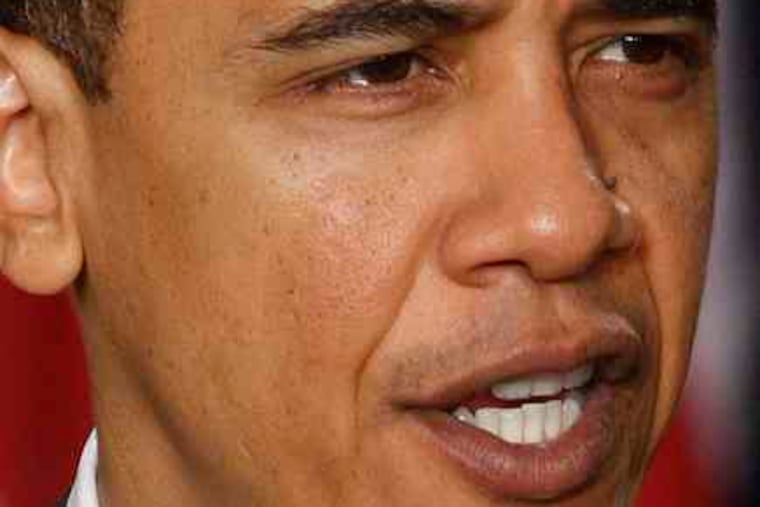PhillyDeals: Memo on stimulus stings D.C. lobbyists
With the government creating trillions of dollars out of thin air to inflate the weak financial system, and Congress voting billions for highways, electronic medical records, rural broadband, and other programs, you'd think this would be a golden age for Washington lobbyists who help direct these dollars to their clients.

With the government creating trillions of dollars out of thin air to inflate the weak financial system, and Congress voting billions for highways, electronic medical records, rural broadband, and other programs, you'd think this would be a golden age for Washington lobbyists who help direct these dollars to their clients.
But K Street and the other corporate-advocacy centers in the federal district were gloomy all week, since President Obama signed an unprecedented memo banning federal officials from talking to registered lobbyists about "particular projects, applications or applicants" for funds under the stimulus law.
"We know we're in a time of intense scrutiny of lobbyists, due to past lobbying scandals. But this goes a lot further," said Christopher Rissetto, head of the Public Policy and Infrastructure team at giant law firm Reed Smith L.L.P.'s Washington office.
A lobbyist's complaint:
"The unintended consequences of this is to deny a broad section of the marketplace an effective way to take advantage of the stimulus initiatives in a very positive way," Rissetto said. "There's nothing untoward about contacting a member of the federal government about the status of your papers."
Lobbyists are still allowed to meet officials about general issues. They're allowed to send letters or other written matter. But all their contacts will be logged and publicly posted (at Recovery.gov).
Some lobbyists have been threatening lawsuits, on the grounds they're being discriminated against as a group. But Rissetto doesn't want to give the wrong idea. "Everyone wants the administration to be successful," he said. "It's just surprised us."
Tax cuts
An extra pair of tax breaks tucked into Philadelphia city regulations last fall helped persuade a New Jersey money manager to move to the old Navy Yard, and city officials are trying to use it to attract more investment firms.
The change exempts hedge funds and other "pooled" investments from the city's business-privilege and net-profit taxes.
"The hedge funds, the fund managers, they all tell us they want this," city Revenue Commissioner Keith Richardson told me.
The city hasn't estimated how much revenue it may lose from the changes because "we basically don't have many of these funds here right now," Richardson added.
Philadelphia is home to Delaware Investments and other managers of stock-and-bond portfolios, but it has attracted few hedge funds, which are concentrated in New York, Connecticut, and suburban locations.
Even investors who do not run hedge funds were concerned about locating here under the old rules, because they feared the taxes might apply to popular new investment products that partly resemble hedge funds, said city commerce director Andrew Altman.
The change was important to Penn Capital Management Co. Inc., a 22-year-old firm that's moving with 60 jobs from Cherry Hill to Liberty Property Trust's Three Crescent Drive in the former Navy Yard, next to the new Tasty Baking Co. plant, where it will also enjoy 10-year Keystone Opportunity Zone sales tax breaks.
The city's willingness to help cut the tax burden sold Penn on the Navy Yard site, said chief financial officer Jerry McBride.
Penn manages $3 billion, mostly in stocks and bonds, including a $25 million piece of the city's cash-strapped pension fund, said marketing chief Christian Noyes.
Total assets are down from $5 billion a couple of years ago because of the investment markets' collapse, Noyes acknowledged. But he said the firm wanted to expand total assets to $10 billion over the next few years, and the Navy Yard site has room to grow, he added.
Philadelphia's investment community, which once concentrated around Broad and Walnut Streets, and socialized at the nearby Racquet Club, mostly moved to the suburbs in the 1970s and '80s, driven partly by the city's former tax on bank investments.
The largest investment employer in the region, the Vanguard Group Inc., has about 10,000 workers in Chester County, where it was planning a new Uwchlan Township campus before the industry slump.
Altman, Richardson, and other city officials pitched the city's new tax policy to a gathering of more than 100 fund managers Thursday at Del Frisco's steakhouse, sponsored by Pepper Hamilton L.L.P. and PNC Global Investment Servicing.
Mayor Nutter said Friday
that he was trying to lure Vanguard and other suburban investment companies to open "satellite offices" in the city.
"We don't compete with the suburbs - what's good for them is good for us, too." But he'd like the city to get a bigger slice.